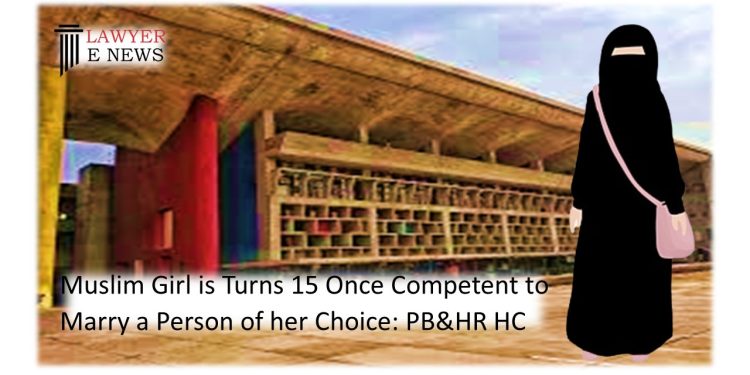Muslim Girl is Turns 15 Once Competent to Marry a Person of her Choice: PB&HR HC

D.D: 13 JUNE 2022
Last week, the Punjab And Haryana High Court granted protection to a 16-year-old Muslim girl who married a 21-year-old Muslim man, noting that she is of Marriageable Age under Muslim Personal Law.
The Bench of Justice Jasjit Singh Bedi was essentially hearing a protection petition filed by the couple (both Muslims) who had married according to Muslim rites and ceremonies. The couple argued before the court that in Muslim law, puberty and adulthood are synonymous and that it is presumed that a person attains adulthood at 15 years of age.Further, it is argued that a Muslim boy or girl who has reached puberty is free to marry whomever he or she chooses, and the guardian has no authority to interfere.
The petitioners’ attorney cited numerous decisions of the Punjab & Haryana High Court, including the decision in Yunus Khan v. State of Haryana and Others. [2014(3) RCR (Criminal) 518.
Their further argument was that their life and liberty are in grave danger at the hands of respondents Nos. 5 to 7, and despite their representation to the Pathankot Senior Superintendent of Police, no action has been taken.
The petitioners’ attorney argued that they would be satisfied at this stage if directives were issued mandating a timely and legally compliant decision on their petition.
The Court began by noting that in the Yunus Khan case, it was determined that the marriage of a Muslim girl is governed by Muslim personal law.
“The marriage of a Muslim girl is clearly governed by the Muslim Personal Law, as stated in a number of rulings cited above. According to Article 195 of Sir Dinshah Fardunji Mulla’s book, “Principles of Mohammedan Law,” petitioner No. 2 was of legal age to enter a marriage contract with a person of her choosing. It is stated that Petitioner No. 1 is older than 21 years old. Accordingly, both petitioners are of marriageable age under Muslim Personal Law.
It should be noted that, according to Article 195 of the book “Principles of Mohammedan Law by Sir Dinshah Fardunji Mulla,” every Mahomedan of sound mind who has attained puberty may enter into a marriage contract, and puberty is presumed, in the absence of evidence, upon completion of 15 years of age.
In this regard, the Court noted additionally,
“The Court cannot close its eyes to the fact that the petitioners’ apprehension must be addressed. Because the petitioners married against the wishes of their family members, they cannot be deprived of their fundamental rights as outlined in the Indian Constitution.”
In light of the preceding discussion, the petition was dismissed with an order to the respondent No. 2 – Senior Superintendent of Police, Pathankot, to decide the petitioners’ representation and take the appropriate legal action.
In India, the legal age of marriage for girls is 18 and for boys it is 21. The Special Marriage Act of 1954 and the Prohibition of Child Marriage Act of 2006 govern this.
Under Muslim law, however, marriage or Nikah is a contract. Adults are permitted by Islamic law to marry of their own free will. These are the requirements for a valid Muslim marriage:
• Both parties must adhere to Islam;
• Both should have reached puberty;
• There must be an offer and acceptance, as well as the presence of two witnesses;
• Dower and Mehar, as well as
• Absence of a prohibited relationship degree.
In the Hadiya Case (Shafin Jahan v. Asokan K.M. and others), the Supreme Court ruled that the legitimacy of a woman’s marriage choice cannot be challenged.
The Union Cabinet approved the proposal to increase the legal age of marriage for women from 18 to 21 on December 15, 2021. This change would bring the legal age of marriage for women to 21 years, the same as for men.
Smriti Irani, the Union Minister for Women and Child Development, introduced the “Prohibition of Child Marriage (Amendment) Bill, 2021” in the Lok Sabha, which seeks to raise the age of marriage for women across all religions to 21.
Gulam Deen and another
Versus
State of Punjab and others





